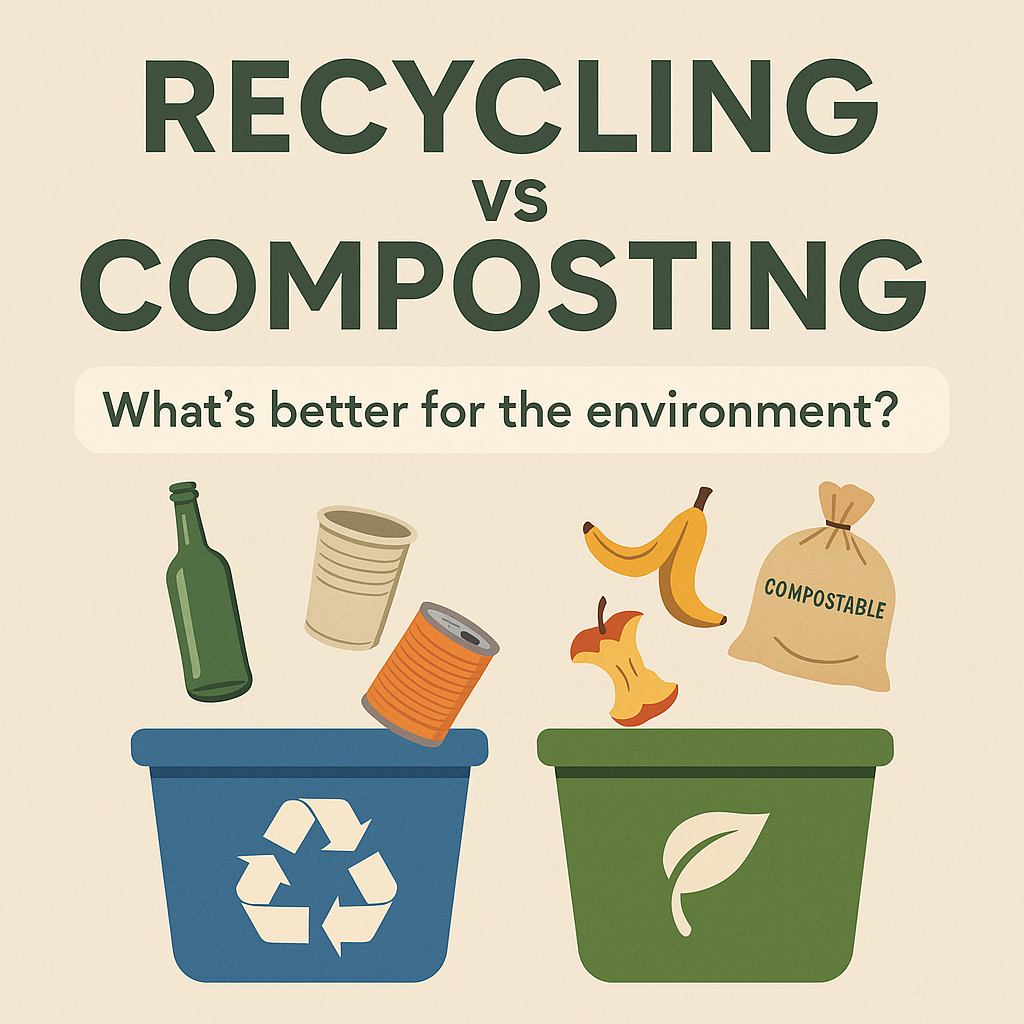As more businesses and consumers strive for sustainable solutions, the debate around recycling vs composting has taken center stage. Both play essential roles in a circular economy, yet they differ in their processes, benefits, and applications. So which is better for the environment? The answer depends on what you’re disposing of—and how.
In this article, we’ll break down the differences between recycling and composting, explore their environmental impact, and help you decide which is best for your brand or household waste.
What’s the Difference Between Recycling and Composting?
At their core, both recycling and composting aim to reduce landfill waste and give materials a second life. However, they operate in fundamentally different ways.
Recycling
Recycling is the process of converting used materials—like plastic, metal, and glass—into new products. This typically involves mechanical or chemical processing to reclaim raw materials.
There are two main types of recycling:
- Post-consumer recycling: Materials are collected after consumer use (e.g., plastic bottles).
- Post-industrial recycling: Waste is recovered during manufacturing (e.g., off-cuts of plastic sheets).
Recycling can result in:
- Item-to-item recycling (e.g., PET bottles to RPET containers)
- Downcycling (e.g., milk jugs into plastic lumber)
However, many items aren’t recyclable due to contamination, mixed materials, or lack of infrastructure—especially in foodservice packaging.

Composting
Composting is the natural breakdown of organic materials—like food scraps, yard waste, and certified compostable packaging—into nutrient-rich soil.
There are two main types:
- Home composting: Ideal for fruit peels, coffee grounds, and other simple organic waste.
- Commercial composting: Handles a wider range of materials, including meat, bones, and certified compostable products.
Composting not only diverts waste from landfills but also returns nutrients to the earth, enriching soil and reducing the need for chemical fertilizers.
Which Is More Sustainable: Composting or Recycling?
It depends on the material, local infrastructure, and your disposal habits. Here’s a comparison of environmental benefits.
Benefits of Composting
- Reduces methane emissions: Organic waste in landfills creates methane, a potent greenhouse gas.
- Improves soil health: Compost is a natural fertilizer that boosts agriculture, reforestation, and land restoration.
- Simplifies foodservice disposal: Compostable packaging and food waste can be tossed in the same bin.
Did you know? If food waste were a country, it would be the world’s third-largest emitter of greenhouse gases—after China and the USA.
Benefits of Recycling
- Reduces raw material extraction: Recycling saves energy and natural resources like timber, oil, and minerals.
- Lowers carbon footprint: Reprocessing materials often uses less energy than producing new ones.
- Prevents plastic pollution: Recycling keeps plastics out of oceans and landfills.
However, only around 9% of plastic waste is actually recycled globally—largely due to contamination, mixed materials, or limitations in sorting facilities.
Why Composting Is Ideal for Foodservice Packaging
In many cases, composting is the most effective end-of-life option for foodservice disposables.
Recyclable plastic packaging is often contaminated with food, making it non-recyclable. Compostable packaging, on the other hand, can go into a commercial composting bin along with food scraps—reducing landfill waste and methane emissions.
Countries like Australia, New Zealand, the UK, and Singapore are already facing challenges with rising food waste. Compostable packaging helps solve this by:
- Curbing contamination in recycling bins
- Supporting organic waste diversion programs
- Turning waste into usable compost instead of methane
How to Know What You Can Compost or Recycle
For Composting
Look for certifications such as:
- ASTM D6400 / D6868 (USA)
- EN 13432 (Europe)
- AS 4736 (Australia)
These standards ensure the product breaks down in commercial composting facilities.
⚠️ Note: Compostable products won’t decompose in landfills or regular recycling streams. Check for access to local composting services before purchasing.
For Recycling
Check plastic resin codes and local recycling guidelines. For example:
- PET (#1) and HDPE (#2) are widely recyclable.
- Mixed materials, soft plastics, or food-soiled containers may not be accepted.
Tools like the Australasian Recycling Label (ARL) in Australia help consumers identify what’s recyclable and what isn’t.
Composting vs Recycling: Which Should You Choose?
Here’s a quick comparison:
| Factor | Recycling | Composting |
|---|---|---|
| Best For | Plastics, metal, glass, paper | Food waste, yard waste, compostable packaging |
| Process Type | Industrial (chemical/mechanical) | Natural biological decomposition |
| Contamination Risk | High (especially in foodservice) | Low (food + packaging can go together) |
| Greenhouse Emissions | Reduces, but still energy-intensive | Significantly reduces methane |
| Product Output | New raw materials | Soil-enriching compost |
Verdict: Use recycling for clean, dry materials and composting for food scraps and certified compostable packaging. Together, they create a powerful solution for sustainable waste management.
Final Thoughts: Use Both Wisely for Maximum Impact
Composting and recycling are not competitors—they’re partners in building a zero-waste future. The key is understanding which method applies to each material and making purchasing decisions that align with available disposal options.
If you’re in the foodservice industry or care about sustainable packaging, compostable products offer a cleaner, more circular solution. When paired with access to commercial composting facilities, they can make a big difference.
Want to explore certified compostable bags and packaging options? Visit hemcbags.com for wholesale compostable solutions that meet the latest environmental standards.

FAQs: Composting vs Recycling
Q: Can compostable products go in the recycling bin?
A: No. Compostable products are designed to break down biologically, not mechanically. They can contaminate recycling streams.
Q: Can I compost at home?
A: Yes, for simple organic waste. For compostable packaging, you’ll need access to a commercial composting facility.
Q: Are compostable bags better than plastic?
A: Yes—when composted properly, they reduce methane emissions and enrich soil instead of polluting landfills or oceans.

